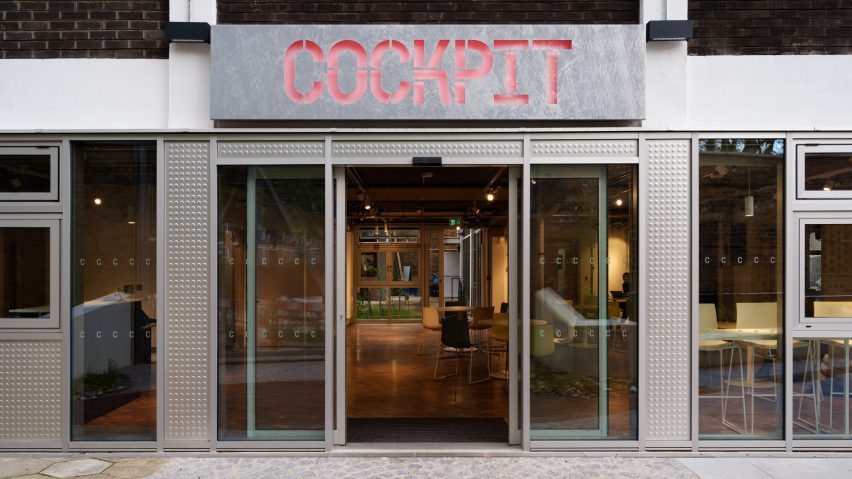A series of interventions by local studio Cooke Fawcett has opened up a cluster of makers' studios in south London to the public and given them a stronger street presence.
The studio revamped and expanded a 1960s office building by a railway viaduct in Deptford, which for twenty years has been home to Cockpit – a social enterprise providing affordable studio space.
While the centre hummed with activity inside, its community of jewellers, metalworkers and woodworkers were hidden away from the local community by the building's 3.5-metre-high boundary wall.
Alongside greater visibility, Cockpit wanted a "permanent public presence" to help stave off the encroachment of residential development and protect its use as light industry. The charity had already fought off redevelopment in 2015, under the Sun Street site-wide residential masterplan.
To achieve this, Cooke Fawcett tore down part of its boundary brick wall and replaced it with a new meshed entrance gate. Metal panels punched with "meccano-style" holes were added to the building facade as a nod to the site's light industrial heritage.
While the main building's 60 studios on its upper floors were largely left as they were, a more extensive remodelling took place on its ground floor to make space for a cafe, visitor foyer and an education room to allow the charity to run programmes with local schools.
"The new connection to the street is one of the most successful parts of the project", said studio co-founder Oliver Cooke.
"The building has been transformed from a previously unwelcoming inaccessible graffitied wall into a open generous series of spaces which encourage passersby to come in to the building, and hopefully feel curious about the activities housed within it."
An underused front yard has been turned into a craft garden, designed by designer Sebastian Cox with rubble beds made from the dismantled wall, and plants that have practical use in crafting such as willow, used in basketry and madder, used in natural dyes.
The design team aimed to draw on the huge body of talent already in situ, commissioning Cockpit-based artist Amber Khokar to create a new mural on the remaining section of the boundary wall.
Featuring over 1000 hand-glazed ceramic tiles, it reflects the area's history and "unsung" local heroes.
The artwork involved the removal of a deteriorating Love Over Gold mural which was painted by the local artist Gary Drostle in 1989 to replace graffiti with the same slogan after it was washed off by the council.
Drostle's mural was part-funded by the rock band Dire Straits, which had lived on the next-door Crossfields Estate and performed in front of the wall in an early 1977 gig. Their 1982 album Love Over Gold was inspired by the original graffiti.
To future-proof the scheme, an air-source heat pump has been installed in the new wood studios, and passive ventilation throughout to meet energy targets.
Oversized radiators were added to facilitate a switch to heat pumps in the main building in a future phase.
Cockpit Deptford is located in the Deptford and New Cross Creative Enterprise Zone (CEZ), one of the first areas in London to be designated by the mayor as an area with affordable workspace for artists and creative businesses.
Cooke Fawcett was founded in 2015 by Cooke and Francis Fawcett, graduates of the University of Cambridge who worked together at architecture practice Herzog & de Meuron, based in Basel and London.
The studio previously designed the Peckham Observatory – an elevated walkway above a multi-storey car park in south London.
The photography is by Max Creasy unless otherwise stated.

